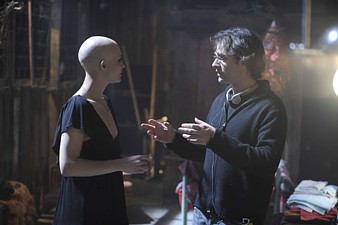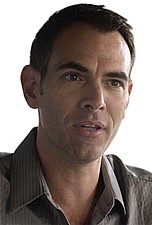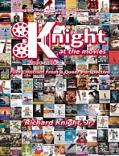
Vincenzo Natali portrait and on set with French actress Delphine Chaneac as Dren
film from a queer perspective
Interview
| KATM media outlets |
| KATM featured weekly |
| Join Us! |
| KATM on RT |
| Vidcast Starring KATM |
| NOTE: THIS SITE ONLY LOADS CORRECTLY WITH EXPLORER AND MOZILLA BROWSERS - SORRY SAFARI USERS! |
| Buy the KATM Book |
Dissecting Splice with Co-Writer/Director Vincenzo Natali
Expanded Edition of 6-2-10 Windy City Times Interview
By Richard Knight, Jr.
Expanded Edition of 6-2-10 Windy City Times Interview
By Richard Knight, Jr.
| Splice is the little sci-fi movie that’s making good. After a 12 year gestation period, Canadian director Vincenzo Natali’s low budget movie, which he co-wrote with Doug Taylor and Antoinette Terry Bryant, is finally hitting theatres. The film, which follows gene splicing scientists (and lovers) Elsa and Clive (Sarah Polley and Adrien Brody) as they splice human and animal DNA together and grow a female to male creature named Dren, was a word of mouth sensation at Sundance and was picked up by a big time producer (Joel Silver) and is now getting a hotly anticipated released by a major Hollywood studio (Warner Bros.). The soft-spoken Natali happily discussed his provocative horror movie (see my rave review HERE) and was especially eager to delve into the gender issues at work in the film. Highlights: *CONTAINS SPOILERS* WINDY CITY TIMES (WCT): I loved the nod to James Whale’s Bride of Frankenstein with the naming of your lead characters as Clive and Elsa (for actors Colin Clive and Elsa Lanchester). Can you talk about why that film and perhaps Whale’s style was so inspirational? VINCENZO NATALI (VN): It’s part of my DNA now. I grew up with it. I remember my mom used to take me every Tuesday night to a little rep theatre in Toronto that would play Universal horror films and that’s where I first saw Bride of Frankenstein. I have great affection for those movies and I think they’re extremely well made. Once I started entering into a story about engineering a human there was no way of avoiding the Frankenstein paradigm so I decided to embrace it. WCT: And like Bride of Frankenstein in particular, Splice combines horror and horrific humor – something very tough to do. Can you talk about that rather tricky approach? VN: I have to say that it comes rather organically from the material which is, let’s face it, the movie is a kind of family drama. There’s just something inherently absurd about the whole situation and therefore, quite humorous. It was a very natural thing to do and I think that horror and comedy are good bedfellows. The key was never to become campy. I never wanted this to become Re-Animator. I wanted to take it very seriously and it helps that I really like all the characters in the film – I really like Clive and Elsa and Dren. WCT: The early scenes of Dren obviously remind one of Alien and Species – both creatures created by H.R. Geiger but you subvert expectations by adding human qualities. VN: Oh absolutely. In some ways, Dren was always going to be in some ways more human than the humans. WCT: “More human than human that’s our motto here at the Tyrell Corporation.” VN: (laughs big) To quote Blade Runner which makes me think that a lot of these things just come by osmosis. I don’t think about it; I’m just so inundated with this stuff it just seeps out of my pores. But yes, Dren was always intended to display as much, if not more, humanity than the scientists in the film. I felt this was a movie where we would discover the monster within our humans. There’s a bit of a role reversal going on. WCT: You really see that in the bond between Elsa and Dren which emulates rotten mother-daughter characters as in Mommie Dearest and Carrie. At first “mother” is so loving and solicitous but when “daughter” begins to misbehave… I’m assuming this was intentional. VN: Oh, unquestionably. This is a mother-daughter story and is echoed in Elsa’s relationship with her own mother who we don’t meet or know too much about but we know there is a disturbing, abusive past there which manifests itself in Elsa when she moves Dren to the barn. That’s the most disturbing part of the film to me. A lot of people find the sex in the movie to be very unsettling but actually the most disturbing thing for me is the scene when Elsa strips Dren and turns her back into an experiment. We’ve seen plenty of examples in real life of human beings doing that to other human beings and it’s really frightening. WCT: There’s a running undertow in the movie that deals with the blurring of gender identity which is such a huge topic in the queer community. I’m thinking of Chaz Bono morphing from female to male for example. Did you and your co-writers ever discuss this? VN: That’s part of the reason I was really looking forward to this interview with you. I sort of intuitively sense that our future is polymorphous – that we’re headed toward some kind of androgynous state which denotes to me a slightly higher step in the evolutionary process. I feel that Dren is more evolved than us and the fact that she can change sex is obviously an ability that humans don’t have – at least not without the assistance of medical science. So – yeah – she’s one crazy, queer creature! (laughs) WCT: That’s interesting you talk about that because this idea of fluid gender identification is relatively new in social culture. You’re straight, you’re gay, you’re bisexual – that identification has always been so rigid and it seems that my young compatriots in the queer community are saying, “I can be anything I want to be. I can morph back and forth.” VN: Right. Absolutely. That’s in the film. WCT: I also read Dren’s uniqueness as the latest in a long history of “different” or “other” individuals which resonate with queer film audiences. There’s the idea of the “parents” trying to make this inherently different “child” conform. Was that planned? VN: I think it is there but I wasn’t – consciously anyway – making any kind of comment about being gay but I think everyone can relate to that. It’s something that crosses all boundaries because human beings are unique and yet we are somehow compelled to put each other into certain categories and sometimes we do that very forcefully and that causes tremendous psychic pain in the people who are forced to be something that they’re not. I think that’s a totally accurate interpretation. I think that Dren is a character, hopefully, that connects with people because there’s a little bit of Dren in all of us. I think everyone on some level is an outsider and on some level must feel that they’ve been brought into a world that doesn’t fully understand them. The tragedy of this is that Clive and Elsa have made something that’s quite beautiful but is never allowed to be free. WCT: The film also addresses the taboo sexual attraction between human and animal or the “other” which brought to mind the documentary Zoo which explored that subject in a very elliptical way. Did you talk to your actors about this? VN: You know, I think they just got it. They’re sick, twisted people (laughs) so they didn’t require much direction on my part. They really loved it. Especially Sarah. She really enjoyed that. She never thought that the script would actually go there and then was wonderfully shocked and happily surprised that it did. They really understood it and we didn’t need to talk about that at all. WCT: I think Dren is going to be embraced by riot grrrls everywhere. She’s like this mega kick-ass lesbian, right? You don’t mess with her. VN: Right! (laughing) That’s right. And that really comes from Delphine (Chanéac) who plays Dren. She’s quite an extraordinary person. She’s an actress but she’s also written two novels and she’s a musician and she’s very physically strong and did a lot of her own stunts. If you connect with Dren it’s because of Delphine and I predict great things for her. WCT: Are we going to see Elsa’s offspring in a sequel? Is he going to grow up to be Dr. Pretorious, the gay mad scientist from Bride of Frankenstein? VN: Oooh! I think so (laughs hard). I don’t know if there will be a sequel but if there is that’s what will happen. If enough people come out we will do one but I never intended the ending as a segue to a sequel even though it feels that way. WCT: Sci-fi, of course, has a huge queer fanbase which I’m sure you’re aware of. VN: Oh, absolutely. WCT: Tell me why queer fans should skip Sex and the City 2 and see Splice instead? VN: (laughs) I’m sure that’s a hard choice. I’ll admit that we don’t have the wardrobe that Sex and the City 2 has but we’ve got some pretty gnarly sex and I’m willing to bet, considerably more interesting sex than you’ll ever see in Sex and the City. WCT: I’m just imagining Dren in a pair of Jimmy Choo’s (both laughing). Vincenzo, wonderful talking with you. Congratulations on “your baby.” VN: Oh, you, too, Richard. Such a pleasure. Really interesting interview! |





